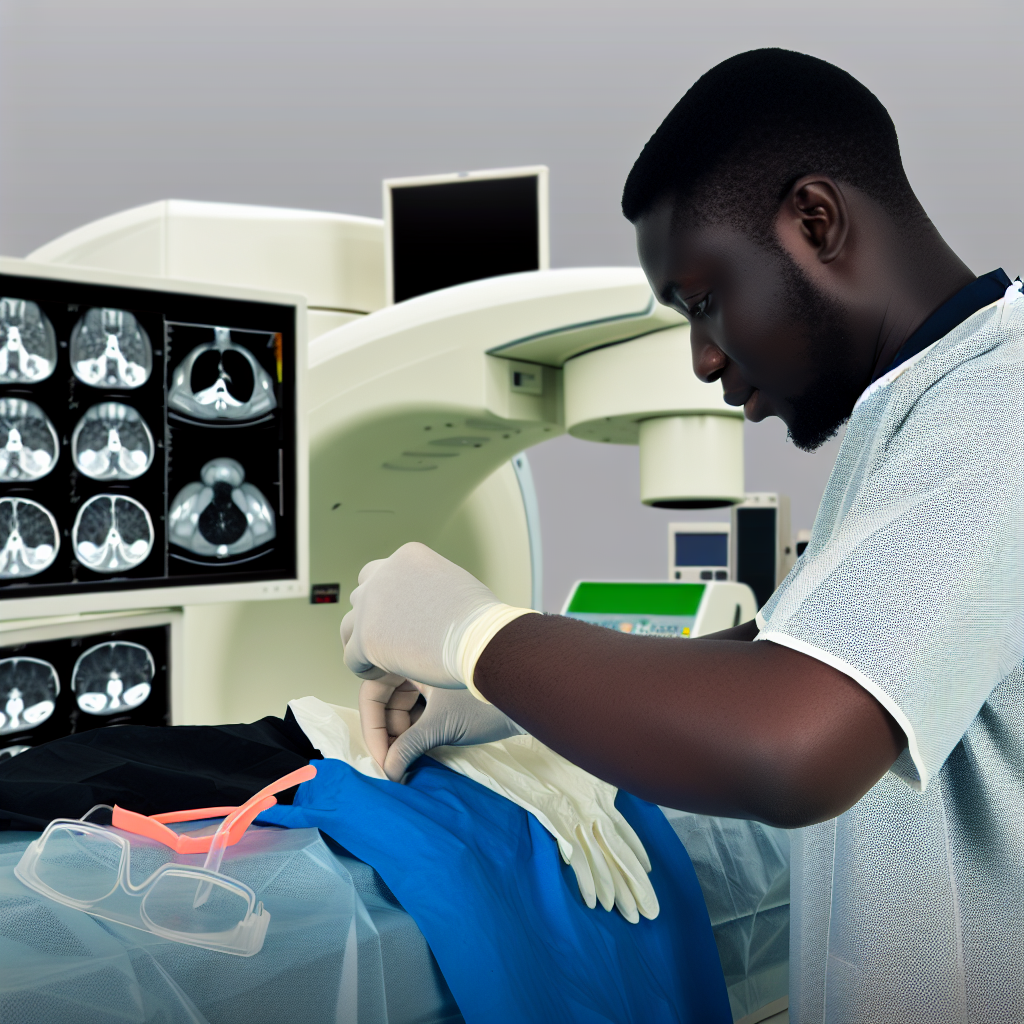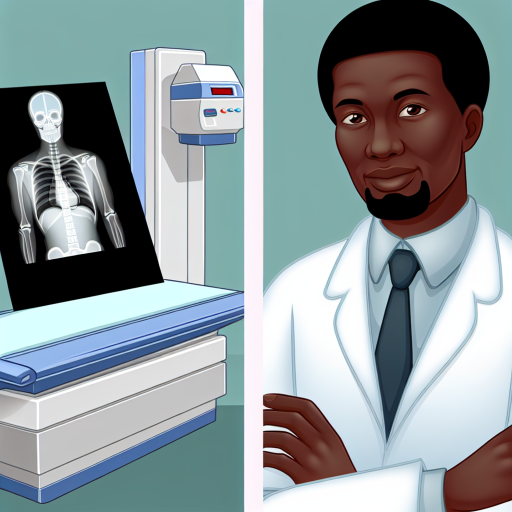Introduction:
Radiology safety protocols are essential in Nigerian clinics to ensure the well-being of patients and healthcare workers.
These protocols aim to prevent harmful effects of radiation exposure during diagnostic procedures.
Implementing strict safety measures is crucial to minimize risks and protect everyone involved in radiology practices.
Without proper safety protocols, patients and healthcare workers are at risk of radiation-induced injuries or long-term health consequences.
Therefore, adherence to established safety guidelines is paramount in maintaining a safe environment in clinics.
Understanding Radiology Safety Protocols:
- Explanation of what radiology safety protocols entail
- Importance of following these protocols to ensure patient and staff safety
What are Radiology Safety Protocols?
Radiology safety protocols are a set of guidelines and procedures put in place to minimize risks associated with the use of radiological equipment and exposure to radiation.
These protocols are designed to protect both patients and healthcare workers from unnecessary radiation exposure during diagnostic imaging procedures.
Key Elements of Radiology Safety Protocols:
1. Proper Equipment Maintenance: Regular maintenance and calibration of radiological equipment are essential to ensure accurate imaging and minimize potential risks.
2. Radiation Dose Monitoring: Continuous monitoring of radiation doses delivered during imaging procedures is crucial to prevent overexposure.
3. Staff Training: Healthcare workers must receive adequate training on radiation safety practices and protocols to ensure safe handling of equipment and patient care.
4. Patient Education: Patients should be informed about the benefits and risks of radiology procedures, including potential radiation exposure, to make informed decisions.
Importance of Following Radiology Safety Protocols:
1. Patient Safety: Adhering to safety protocols helps in reducing the risk of unnecessary radiation exposure, ensuring the well-being of patients undergoing imaging studies.
2. Staff Safety: Healthcare professionals working with radiological equipment are also at risk of radiation exposure, and following safety protocols protects them from harm.
3. Legal Compliance: Medical facilities must comply with established safety regulations to avoid potential legal issues and ensure quality patient care.
4. Image Quality: Proper implementation of safety protocols contributes to obtaining high-quality diagnostic images, leading to accurate diagnoses and effective treatment.
Common Challenges in Implementing Radiology Safety Protocols:
1. Lack of Resources: Some healthcare facilities in Nigeria may face challenges in acquiring and maintaining up-to-date radiological equipment and safety measures.
2. Training Deficiencies: Insufficient training for healthcare staff on radiation safety protocols can result in lapses in adherence to established guidelines.
3. Compliance Issues: Limited awareness or understanding of safety protocols among staff members may lead to non-compliance with established procedures.
4. Cultural Factors: Cultural beliefs or practices in Nigeria might influence patient perceptions towards radiation exposure and adherence to safety protocols.
Strategies to Enhance Radiology Safety Protocols in Nigerian Clinics:
1. Continuous Education: Regular training sessions and workshops on radiation safety protocols for healthcare workers can improve awareness and compliance.
2. Quality Assurance Programs: Implementing quality assurance measures to monitor adherence to safety protocols and ensure equipment functionality is essential.
3. Collaboration and Networking: Establishing partnerships with international organizations and other healthcare facilities can provide insights into best practices for radiology safety.
4. Patient Engagement: Encouraging patients to ask questions and seek clarifications about radiology procedures can enhance their understanding and cooperation with safety protocols.
Promoting a Culture of Safety in Radiology:
Adherence to radiology safety protocols is paramount in ensuring the well-being of patients and healthcare workers in Nigerian clinics.
By understanding the importance of these guidelines and implementing strategies to overcome challenges, healthcare facilities can promote a culture of safety and quality care in radiology practices.
Specific Safety Measures in Nigerian Clinics:
Nigerian clinics have implemented specific safety protocols to ensure the well-being of patients and staff.
These safety measures are in line with international standards and best practices to guarantee quality healthcare delivery.
Use of Protective Equipment:
Healthcare workers in Nigerian clinics are required to use personal protective equipment such as gloves, masks, and gowns.
This helps in preventing the transmission of infections and ensures the safety of both patients and staff.
Proper Radiology Room Setup:
Radiology rooms in Nigerian clinics are designed to minimize radiation exposure to both patients and radiology technicians.
Lead aprons and thyroid shields are provided to patients to protect sensitive organs during imaging procedures.
Regular Equipment Maintenance:
Nigerian clinics adhere to strict guidelines for the maintenance and calibration of radiology equipment to ensure accurate and safe imaging.
Regular inspections and quality control checks are carried out to identify and rectify any potential issues with the equipment.
Radiation Dose Monitoring:
Nigerian clinics closely monitor the radiation doses used during imaging procedures to prevent overexposure to patients.
Technicians are trained to optimize imaging protocols to achieve high-quality images with minimal radiation dose.
Staff Training and Education:
Continuous training programs are organized for radiology technicians and staff in Nigerian clinics to update their knowledge and skills.
This ensures that staff are aware of the latest safety protocols and best practices in radiology imaging.
Emergency Response Preparedness:
Nigerian clinics have emergency response protocols in place to handle any unforeseen incidents or medical emergencies during imaging procedures.
Staff are trained in basic life support and first aid to provide immediate assistance in case of emergencies.
Patient Education and Informed Consent:
Patients in Nigerian clinics are educated about the risks and benefits of radiology procedures and are required to give informed consent.
Transform Your Career with Expert Guidance
Get personalized mentorship consulting that’s tailored to your unique path. Our expert advice is actionable and exclusive.
Get StartedThis ensures that patients are aware of the safety measures in place and can make informed decisions about their healthcare.
Infection Control Practices:
Nigerian clinics have strict infection control practices in place to prevent the spread of communicable diseases in healthcare settings.
Regular cleaning and disinfection of radiology equipment and rooms are done to maintain a safe and hygienic environment.
Collaboration with Regulatory Authorities:
Nigerian clinics collaborate with regulatory authorities to ensure compliance with national and international safety standards in radiology imaging.
Regular audits and inspections are conducted to assess and improve the safety practices in clinics.
Patient Advocacy and Feedback:
Nigerian clinics encourage patient feedback and advocacy to continuously improve safety protocols and patient experience in radiology imaging.
Patient satisfaction surveys are conducted to gather feedback and suggestions for enhancing safety measures in clinics.
Nigerian clinics prioritize patient safety and quality care by implementing specific safety measures that adhere to international standards and best practices in radiology imaging.
You Might Also Like: How to Prepare for Anatomy Exams in Nigerian Universities
Training and Education:
Training and education play a crucial role in ensuring the safety of patients and staff in Nigerian clinics when it comes to radiology procedures.
It is imperative that all radiology staff are adequately trained on safety protocols to prevent any potential risks or hazards during imaging procedures.
One of the main reasons why training staff on radiology safety protocols is essential is to minimize the chances of errors or accidents that could lead to patient harm.
By providing comprehensive training, healthcare providers can ensure that their staff are equipped with the knowledge and skills to handle radiology equipment safely.
Continuous education is equally important in the field of radiology safety.
As technology advances and safety standards evolve, it is crucial for healthcare professionals to stay updated on the latest protocols and best practices.
This ongoing education ensures that staff are aware of any changes in guidelines and can adapt their practices accordingly.
By investing in training and education for radiology staff, clinics in Nigeria can improve the overall quality of care they provide to patients.
Staff who are well-trained and knowledgeable about safety protocols are better equipped to handle emergencies and ensure the well-being of patients undergoing imaging procedures.
Moreover, continuous education helps to instill a culture of safety within the clinic.
When staff are regularly updated on safety standards and protocols, they are more likely to prioritize safety in their everyday practices.
This ultimately leads to a safer environment for both patients and employees.
Training staff on radiology safety protocols and providing continuous education are essential components of ensuring the safety and well-being of patients and staff in Nigerian clinics.
By prioritizing safety through training and education, healthcare providers can create a culture of safety and ultimately improve the quality of care they deliver.
See Related Content: Microbiology Journals and Publications in Nigeria
Equipment Maintenance:
- Importance of regular maintenance of radiology equipment to ensure safety:
- Discussion on the consequences of neglecting equipment maintenance:
Regular maintenance of radiology equipment is crucial to ensure accurate and reliable results.
Without proper maintenance, equipment can malfunction, leading to incorrect diagnoses and potential harm to patients.
Regular maintenance helps to identify and address any potential issues before they escalate, ensuring that the equipment remains in optimal condition for use.
Neglecting equipment maintenance can have serious consequences, including compromised patient safety, inaccurate diagnoses, increased downtime due to unexpected breakdowns, and potential legal issues.
Furthermore, neglecting maintenance can shorten the lifespan of the equipment, leading to costly repairs or replacement.
Inadequate maintenance can also result in poor image quality, which can affect the overall quality of patient care.
Additionally, neglecting maintenance can lead to increased radiation exposure for both patients and healthcare providers, posing a significant health risk.
Overall, neglecting equipment maintenance can have far-reaching implications for both patients and healthcare providers.
Learn More: Exploring Cutting-Edge Medical Disciplines Revolutionizing Healthcare in Nigeria

Staff Protection:
- Explanation of the measures taken to protect radiology staff from radiation exposure
- Discussion on the use of personal protective equipment and shielding
Working in a radiology clinic exposes staff to various levels of radiation on a daily basis.
It is essential for clinics to implement stringent safety protocols to protect their employees from potential harm.
Measures to Protect Radiology Staff:
Radiology clinics need to have strict guidelines in place to ensure the safety of their staff.
One of the key measures taken is ensuring that all personnel working in the radiology department receive thorough training on radiation safety.
This includes understanding the risks associated with radiation exposure and how to minimize them.
Another crucial step is the use of monitoring devices such as dosimeters.
These devices track the amount of radiation exposure that staff receive over a given period.
By regularly monitoring radiation levels, clinics can ensure that staff are not exceeding safe limits of exposure.
Personal Protective Equipment:
Personal protective equipment (PPE) is essential in shielding radiology staff from radiation.
This includes lead aprons, thyroid shields, and protective eyewear.
These items act as a barrier between staff and radiation, reducing the risk of exposure to harmful rays.
All radiology staff should be equipped with the necessary PPE and trained on how to wear them correctly.
Regular checks should be conducted to ensure that PPE is in good condition and provides adequate protection.
Proper maintenance of PPE is crucial to its effectiveness in protecting staff.
Shielding:
In addition to PPE, clinics must have proper shielding measures in place to protect their staff.
This includes lead-lined walls and doors in the radiology rooms to prevent radiation leakage.
Shielding helps contain radiation within the designated area, reducing the risk of exposure to staff in adjacent rooms.
Regular inspections of shielding materials should be conducted to ensure their integrity.
Any damages or wear and tear should be promptly repaired to maintain an effective barrier against radiation.
Shielding is a critical aspect of radiology safety protocols and must not be overlooked.
Protecting radiology staff from radiation exposure is a top priority for clinics in Nigeria.
By implementing strict safety measures, providing adequate PPE, and maintaining shielding, clinics can ensure the well-being of their employees.
Continuous training and monitoring are essential components of a comprehensive safety program to protect staff in the radiology department.
Find Out More: Why Emergency Medicine is Critical to Nigeria’s Healthcare Future
Patient Safety
Ensuring patient safety during radiology procedures is crucial for the overall well-being of individuals undergoing diagnostic imaging.
It is essential to educate patients on safety measures to minimize risks and potential harm.
Healthcare providers play a significant role in guaranteeing patient safety and must adhere to strict protocols and guidelines.
Importance of Educating Patients
- Educating patients on safety measures before radiology procedures is vital in promoting awareness and understanding of potential risks.
- Patients need to be informed about the importance of following instructions provided by healthcare professionals to ensure a safe imaging process.
- Understanding the risks involved in different radiology procedures helps patients make informed decisions and actively participate in their healthcare.
- Education empowers patients to communicate effectively with healthcare providers, ask questions, and raise concerns about safety during imaging.
- Ensuring that patients are aware of safety protocols can help prevent accidents, injuries, and adverse effects during and after radiology procedures.
Responsibility of Healthcare Providers
- Healthcare providers have a duty to prioritize patient safety and implement safety protocols during radiology procedures.
- It is essential for healthcare professionals to assess each patient’s medical history, allergies, and specific needs before conducting any imaging tests.
- Providers must communicate effectively with patients, explaining the procedure, potential risks, and safety measures to address any concerns or questions.
- Strict adherence to safety guidelines, such as shielding vulnerable areas, using appropriate equipment, and monitoring radiation doses, is crucial for patient safety.
- Regular training and education for healthcare staff on safety protocols and best practices help maintain high standards of patient care in radiology clinics.
Patient safety in radiology clinics relies on a collaborative effort between patients and healthcare providers.
By educating patients on safety measures and ensuring strict adherence to protocols, the risk of adverse events during radiology procedures can be minimized.
This commitment leads to better outcomes and improved quality of care for all individuals.
Importance of Radiology Safety Protocols
Radiology safety protocols play a crucial role in ensuring the well-being of patients and staff in Nigerian clinics.
By adhering to these protocols, clinics can minimize the risks associated with radiation exposure.
This approach enhances the quality of patient care significantly.
It is essential for clinics to prioritize and continually improve their safety measures.
This commitment helps maintain a safe environment for everyone involved.
By investing in training, quality control measures, and regular audits, clinics can assure their patients of the highest level of care.
At the same time, this minimizes the potential risks associated with radiology procedures.
The call to action for clinics in Nigeria is to place a strong emphasis on radiology safety protocols.
By doing so, clinics can fulfill their duty to protect both patients and medical staff.
This, in turn, promotes a culture of safety and excellence in healthcare practices.
Additional Resources
Status of Magnetic Resonance Imaging Systems and Quality Control …
The Landscape of Pediatric Radiation Oncology in Nigeria | JCO …




